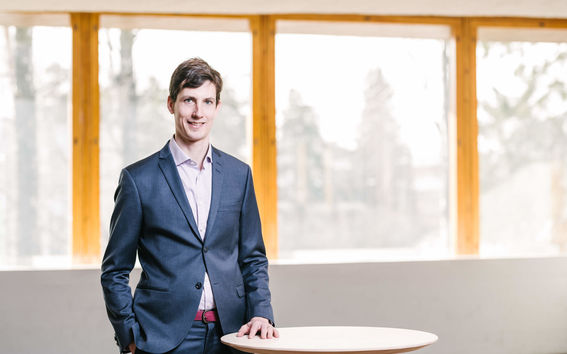Max Finne: I aim for breakthroughs by developing research on service productivity

Assistant Professor Max Finne, what are you researching and why?
I have several research topics and interests, one of which is the productivity of services. It is of particular interest to me because nowadays most of the GDP of both Finland and other developed economies consists of services. The productivity development of services has been weak for a long time, which causes great challenges to our national economy’s long-term economic growth and the sustainability of public finances. Improving service productivity would have major positive effects on the economic well-being of all of us.
In particular, I have studied the improvement of the productivity of university education, which is a great challenge especially at a time when the public economy is under constant pressure for cuts, but at the same time developing the level of education for workforce is the key to future success. In practice, improving productivity in this case means providing higher quality education for more people with existing or smaller resources.
I have recently studied how mass lectures could be replaced with teaching methods that better support learning without increasing universities’ need for resources and funding. A way of implementing technology-enhanced flipped learning was developed as a solution. With the help of flipped learning and video lecturettes, it was possible to dive deeper in topics such as company cases during the actual lectures, since students were already familiar with the basics on the basis of the video lecturettes. In addition, these video lecturettes were utilised for several years and continued to be utilised with minor updates to make effective use of the original investment in video creation.
How did you become an Assistant Professor in Information and Service Management?
During my studies, I was sure that I would work in industry after graduation. However, after completing my Master's thesis in Operations Management in the Department of Industrial Engineering and Management, I decided to continue my studies. During the final stages of working on my doctoral dissertation, I decided that after receiving my doctorate I would switch over to the business world, but then I received a pivotal call from Warwick Business School. They invited me to a job interview where I met my friendly future colleagues and decided to move to England for an Assistant Professor position.
In the encouraging environment of Warwick's top university, research and teaching progressed nicely and I received an early promotion to Associate Professor and a permanent employment relationship in July 2018. However, due to a family situation, I ended up moving back to Finland, and fortunately was hired in my current Assistant Professor position in the School of Business.
What have been the highlights of your career so far?
The first thing that comes to mind is the promotion to Associate Professor in Warwick Business School in summer 2018. The four years of experience abroad are unquestionably valuable, but I am still excited about the opportunities offered by Aalto University. Despite all publications and teaching awards, the most important aspects of my career are amazing colleagues around the world as well as student feedback on successful teaching.
Which qualities are the most important for you to succeed in your work?
In the work of Assistant Professor at Aalto University, success is measured using the criteria of the Tenure Track (TT) career system. Measuring success through these criteria has a profound impact on assistant professors, and meeting the criteria requires strategic thinking, prioritisation of matters, and disciplinary work. When considered more broadly, successful work as a professor requires not only top-level expertise in the subject field and methodology, but also excellent cooperation skills, the ability to lead people and the ability to find time for yourself in a hectic schedule. Without some free time every once in a while, the creative thinking required for top research is not possible.
What do you expect from the future?
At present, topmost on my mind is meeting Aalto University's TT criteria in order to safeguard the continuation of my career at Aalto beyond a few years. In the long term, my goal is to develop service productivity research. I am hoping for breakthroughs that have major impacts on both research and the practical operations of organisations. At the same time, I continuously strive to grow as a teacher, lecturer and executive educator.
Max Finne is currently looking for motivated and cooperative doctoral students whose research interests are connected to his research topics. Don’t hesitate to reach out!
Read more news

Apply Now: Unite! Visiting Professorships at TU Graz
TU Graz, Austria, invites experienced postdoctoral researchers to apply for two fully funded visiting professorships. The deadline for expressions of interest is 20 February 2026, and the positions will begin on 1 October 2026.Soil Laboratory Exhibition – Exploring the Dialogue Between Human and the Earth in Utsjoki
Soil Laboratory explores the relationship between humans and the earth as a living landscape through ceramic practices in Utsjoki.
The Finnish Cultural Foundation awarded grants for science and art
A total of 15 individuals or groups from Aalto University received grants






